Cloud technology from Macedonia or managing a B2B online project remotely. Part 2, business incubator in Skopje
To raise the morale of the readers of Megamind and my own morale, in the conditions of the ending summer, I continue the story of solar Macedonia, the summer season in which ends only at the end of October. By the way, the choice of Macedonia as a country for long-term residence and distant work was also conditioned by a good climate - not as hot as in Southeast Asia and not so dank as in Western Europe with all the attributes of a European country and accessibility of major European IT events . The Balkan climate is completely superimposed on the fragile physiology of the Moscow office samurai - there are no critical winter temperatures and no sweltering heat all year. In urban parks you can meet both sweet birch and exotic yuccas or even sit under a palm tree with a laptop, if it is important for someone to work under a palm tree.
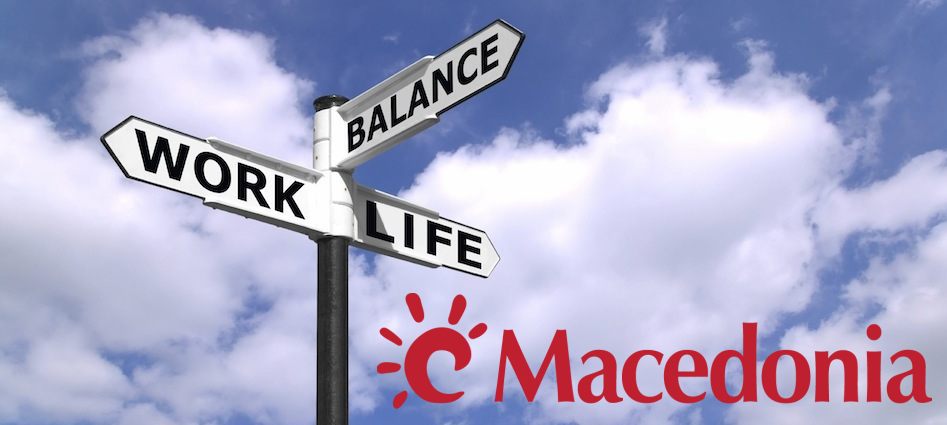
At the airport in Skopje, the Wizzair low cost airline was tightly populated with the help of which, if you follow the actions, you can fly to London or Milan and return for a symbolic 89 euros. Initially, when relocation was planned, I assumed that working remotely on our AltegroCloud project a European business segment could be formed and I would need to periodically move around Europe in search of new, undeveloped competitors, market segments for conducting numerous and effective negotiations and presentations somewhere on Azure Shore or in the City of London. As further practice showed, attempts to promote SaaS IP-PBX in the Balkans are not an easy job, to say the least, but about this in the next publication. Today I would like to talk about the economic side and the format of the residence of an IT entrepreneur in Macedonia.
')
It is clear that if you live in another country and at the same time work and not just travel, mastering the monthly income from the rental of a two-bedroom apartment in the metro station Preobrazhenskaya Square, you will have to work and work almost as much as in Russia, maximally coinciding with your schedule Moscow colleagues, customers and partners, that is, 8-10 hours a day. So you need a workplace, smart Internet and relative peace around, because the hard mental work of the SaaS project manager does not tolerate the hustle and bustle around. Before leaving, having no previous experience of distant work, I naively suggested that “on time” I organize working time and space in the same apartment where I will live with my family, with a harsh shout I will calm the two-year-old son and piercing eyes with my panther at the moment when I hold the next, reporting and election, Skype conference with colleagues. With such approaches, the budget of the organization of the workplace completely coincided with the budget for renting an apartment.
Renting an apartment in Skopje (and this is the most expensive city in the country) is possible for relatively small, even in today's difficult times, money: for a two-room apartment of 60 square meters, in a quiet area, among pines and low-rise buildings, they will ask for around 200 euros without utilities payments. As a bonus, you will receive a crowing of cocks in the morning, a complete absence of traffic jams, friendly and relaxed Slavic neighbors and a fairly acceptable cable Internet channel megabit for 5 (optics are mainly in the central and business part of Skopje). The Macedonian “dvushka” is a full-fledged Moscow “treshka” both in terms of area and number of rooms (the Macedonians consider only bedrooms to be rooms). The communal apartment is also relatively inexpensive and about the same for all districts of the city - 60-80 euros in the summer and 120-150 euros in the winter will be paid for 60 sq. Meters (the cost of heating is added, the heating season is November-March). In the city center, close to shopping centers and parties (and parties in Skopje never stop), a similar apartment can be rented for 300-350 euros per month with the same utility bills. Five minutes walk and you are in the central square of Skopje with the world famous Stone Bridge.
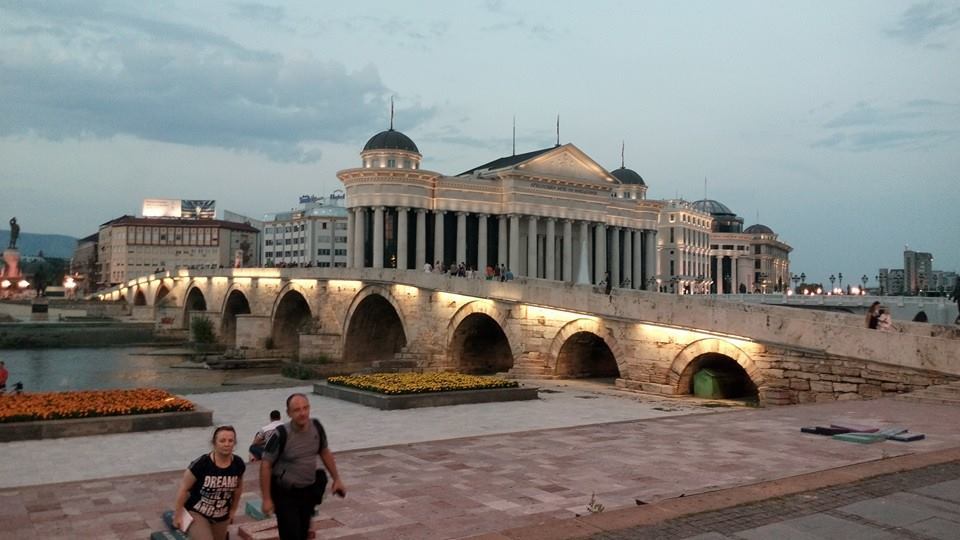
The Internet is available almost everywhere and is offered by default. Cable Internet 5-10 Mbit / s together with 100 cable TV channels - about 15-20 euros per month, if you want space speeds up to 50 Mbit and optics to the apartment - you will have to pay 30-40 euros per month and it’s not a fact that Your home has such a connection. You can also use the mobile Internet, it runs quite brightly here and is relatively inexpensive - 5 euro for 5 Gb of traffic, followed by a speed limit until the end of the month. Through my cable Internet from the provider TeleKabel without bugs work and Skype with video and applications that are critical to delays. In total, about 5-6 providers will reach Skopje, penetration, as I said, is almost 100%.
In short, I started working in an apartment rented via the Internet with a huge terrace and a gorgeous view of the mountains. This is how the first time my workplace looked like (pictures, by the way, were taken at the end of October, the weather completely allows you to work outdoors).
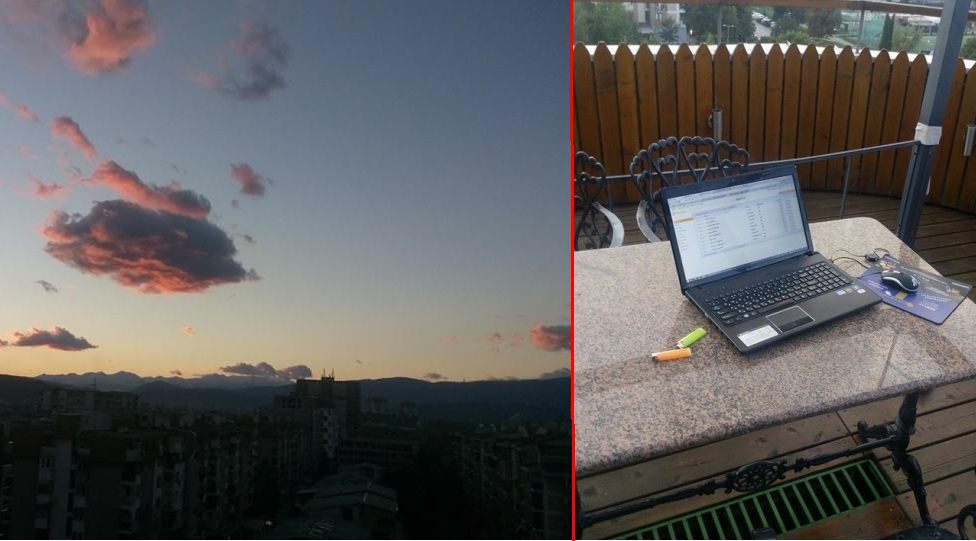
At first, work at home and the truth became more efficient and faster - the Balkan air and the relaxed atmosphere fairly added positives and a desire to work, I began to think that the home-based project management format — life hacking, which I, as one of the elect, as a real highlander, opened for yourself as the innermost secret of being, inaccessible to the office majority, suffering from vegetative-vascular dystonia. Everything, indeed, looked extremely attractive: the cost of food and travel to exotic places dropped significantly. A family of three people in Macedonia can easily live on not very big money - food is enough for 300-400 euros for everyone, trips to the sea are sheer nonsense: to Greek Thessaloniki and the sea, respectively, a little more than 200 km or 2 hours on cars. At 10-15 euros, you can have a great dinner together in an expensive restaurant, and coffee even in the coolest coffee shop in the center costs about 1 euro.
Everything is good, but something is not good. Over time, it came to understand: working at home is convenient and saves time, but the minuses turned out to be more than advantages - a two-year-old son refused to understand that his father in Skype conference communicates with serious uncles, not with the Left Truck, and that cry-scream - you can't throw toys, and the wife, who decided that since the husband is now working from home, then this same husband can be “loaded” with household chores and that the family “is much more important than any work.” Having worked in a home-based format for about six months, I realized that I had to urgently throw out of the house. Felling into the office and working there, otherwise the efficiency will soon collapse to zero, since the usual telephone conversation or email response began to turn into a role-playing game with running around with a laptop and a mobile phone at the corners of the apartment, even if it is big enough. It was decided to rent an office at any cost.
Commercial real estate in Skopje, as they say, heaps. Even such business centers are being built.
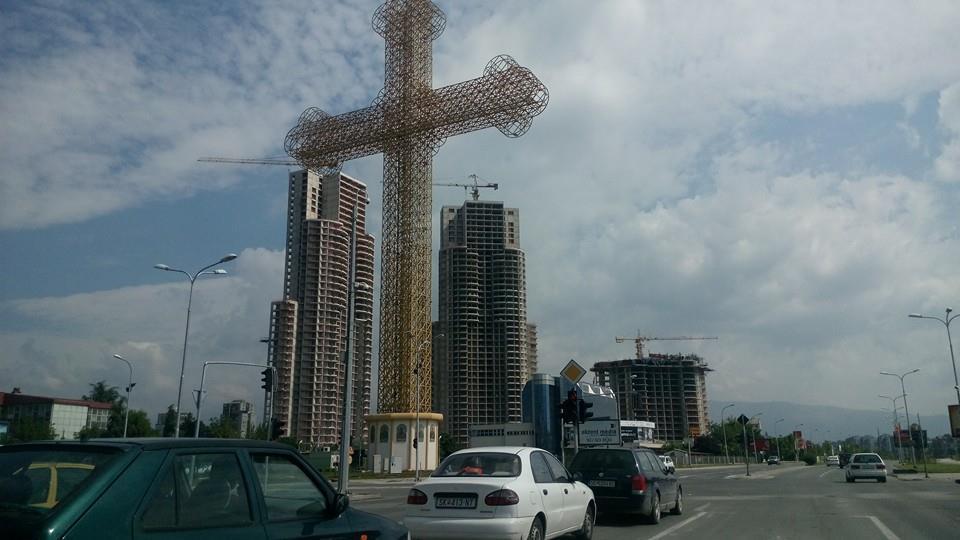
The search for premises in Macedonia is a simple and relatively inexpensive task: business activity in Skopje is very different from business activity in San Francisco and there is office space everywhere, and for an office of 10-15 square meters they ask no more than 150-200 euros per month even in the class A business center. But I wanted something special, with the appropriate environment, atmosphere and surroundings, and so that the office neighbors admired my competencies and offered multimillion contracts. One of my friends, having learned that I was looking for premises for an office of an IT company, advised me to contact the Macedonian business incubator YES , as a matter of fact, the only IT business incubator in the country.
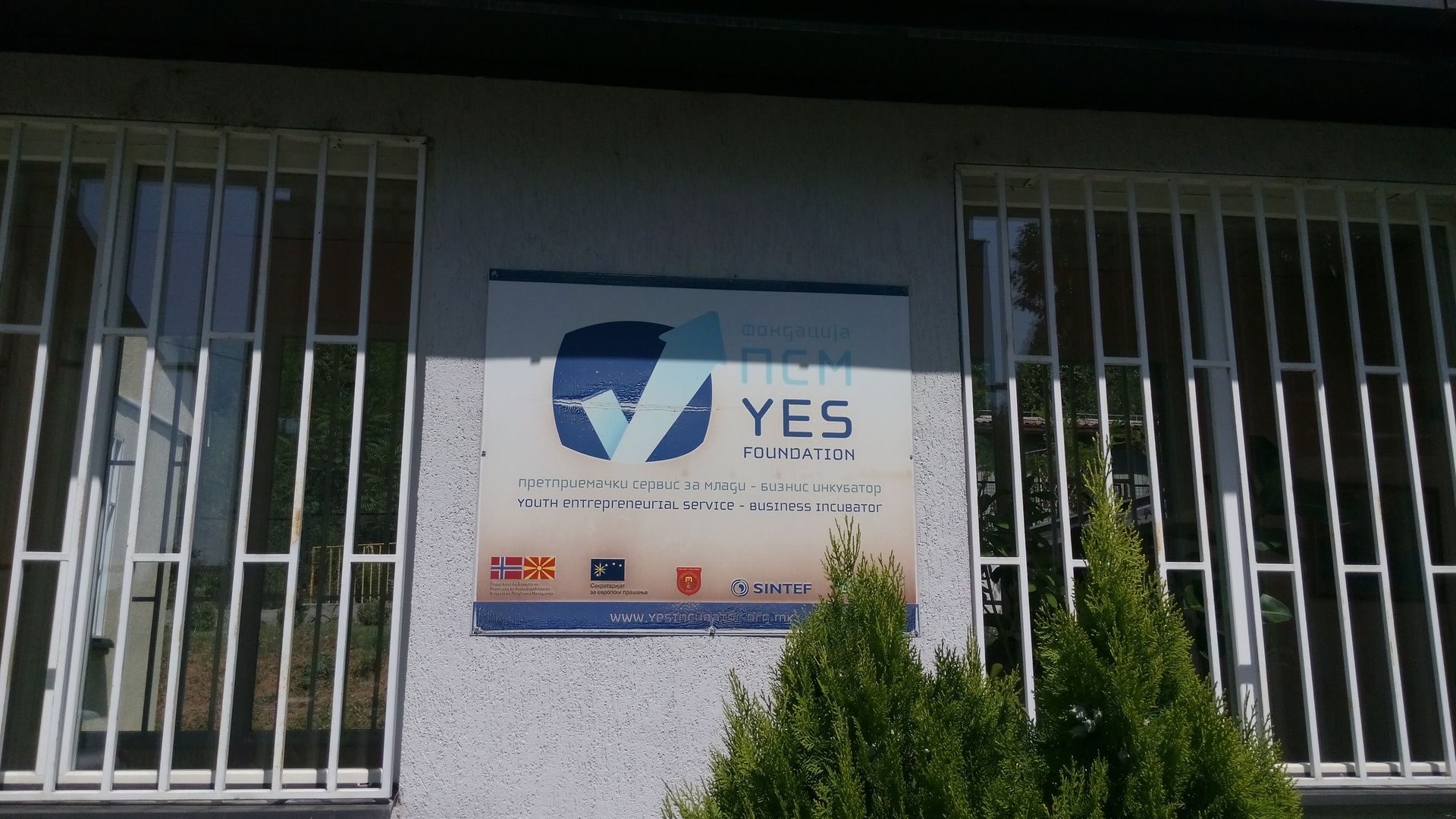
The YES incubator exists with funds allocated by the EU for business development in Eastern Europe and is well funded. Absolutely, free cheese at YES does not offer, but the residency conditions are more than loyal, and the requirements for potential residents are absolutely not “star”. After a couple of meetings with officials and filling out the required applications in English, I began to wait for the commission’s decision, with little doubt about the positive result: the Russian, experienced, who had turned gray in the telecom field, the project manager wanted to become part of the IT community of a small Balkan country. And, indeed, a week after submitting the application I was accepted. True, not at all because they saw in me the savior of the telecom industry of all Eastern Europe, but because one of the residents had just “soaped out” to move to cut a startup in Scandinavia and the office was vacated.
Actually, the incubation conditions themselves: the program is designed for a year, as part of acceleration they provide office space with a substantial discount for rent, free parties, events, meetings with mentors and officials from the Ministry of Communications, help and support in all beginnings at the government level, as well as free coffee , office supplies, breakfast in the student cafeteria, meeting rooms and conference rooms.
For a fully furnished office with an area of 10 square meters, I have to pay 80 euros a month with all the utility bills included and 50 Mbps with an optical Internet channel. The office building itself is located on the territory of the University of St. Cyril and Methodius, around the mountains, parks, churches and friendly Macedonians.
Incubator outside

inside
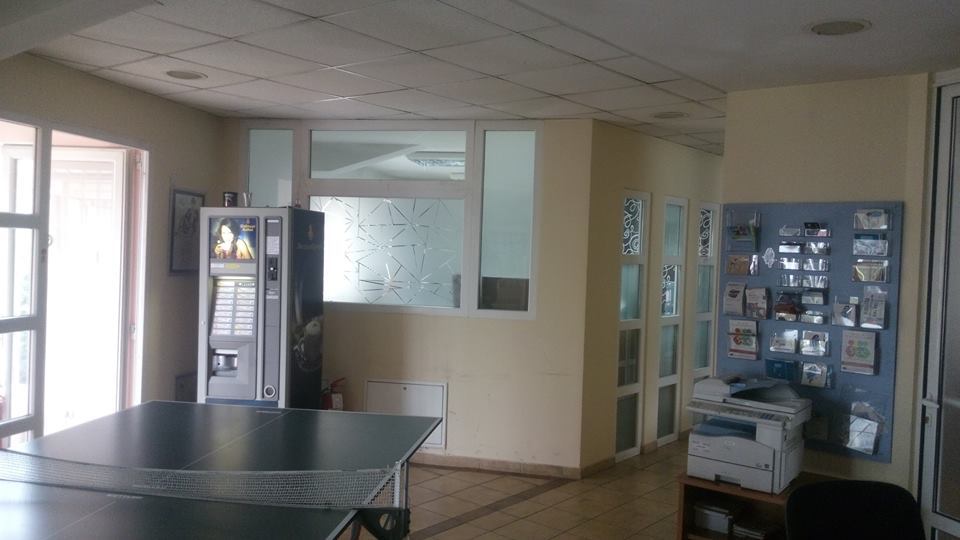
motivating promo

my 10 square meters

Resident colleagues are young and not very Macedonian companies trying themselves in the field of IT entrepreneurship. The specificity of the country is such that it is impossible to build a high-marginal business, focusing only on the domestic market: the market is small, specific, and very difficult to invest. Therefore, the guys are trying to work on European markets, and many are doing great. No mega breakthrough business ideas have yet been found, but in general, all businesses are in trend. Macedonians are practical people and are primarily concerned with making profits; there are practically no startups living on venture money in our incubator.
A colleague Gligor has been engaged in 3D modeling for several years and successfully develops his project in the markets of Switzerland and the UK. From work leaves very late - a lot of work. Gligor and I often discuss methods and technologies for the consumption of strong alcoholic beverages in Russia.

Colleagues Nikola and Igor are almost not interested in statistics on the consumption of spirits in the Russian Federation, but often spend time in the courtyard, actively discussing the difficult fate of an IT entrepreneur in the Balkans. The guys are promoting their website builder in the European market and, judging by the fact that they are at work even on weekends, the business is “rushing”

The incubator often hosts meetings and IT parties, regularly sending out invitations to European events, participation in which is paid from YES funds. I actively “reside” in the incubator soon for half a year and are completely satisfied with the current format of my work, there is simply no desire to look for other options, I found the perfect office.
Summarizing the financial results of the remote “Macedonian format”, I’ll give some average economic statistics of life in Skopje:
- rent a comfortable apartment, 60-70 square meters - 250-350 euros per month with utility bills;
- Nutrition for a family of three "I do not deny myself anything" - 300-400 euros;
- cafes and restaurants for two - 10-25 euros for a full meal;
- travel by public transport one way - 0.5 euro;
- Internet channel for home - 15-20 euros;
- cellular communication per month with 3G / 4G package “to be enough for facebook and skype” - 10-15 euro per month;
- office rental 10 square meters. meters, with all payments and costs (my case) - 80 euros per month;
- business lunch in a nearby cafe - 2-3 euro
- periodic and sometimes spontaneous trips to the sea in Greece for a weekend for a family, including apartments for two nights and the cost of gasoline - 100 euros;
- round-trip air ticket to Berlin or Milan or else where to Europe - 90-100 euros;
- air ticket to Moscow and back per person - 250-300 euros;
It is clear that it is almost impossible to live in a European country near the points of gravity of the world venture capital and not to try to get closer to these same points. For the year of my life in Macedonia, I honestly collected IT statistics, went to exhibitions, analyzed the prospects for our project in Eastern Europe, met "who you need" and formed a certain vision of the IT market in the Balkans, which, of course, I am ready to share in the next publications.
To be continued…

At the airport in Skopje, the Wizzair low cost airline was tightly populated with the help of which, if you follow the actions, you can fly to London or Milan and return for a symbolic 89 euros. Initially, when relocation was planned, I assumed that working remotely on our AltegroCloud project a European business segment could be formed and I would need to periodically move around Europe in search of new, undeveloped competitors, market segments for conducting numerous and effective negotiations and presentations somewhere on Azure Shore or in the City of London. As further practice showed, attempts to promote SaaS IP-PBX in the Balkans are not an easy job, to say the least, but about this in the next publication. Today I would like to talk about the economic side and the format of the residence of an IT entrepreneur in Macedonia.
')
It is clear that if you live in another country and at the same time work and not just travel, mastering the monthly income from the rental of a two-bedroom apartment in the metro station Preobrazhenskaya Square, you will have to work and work almost as much as in Russia, maximally coinciding with your schedule Moscow colleagues, customers and partners, that is, 8-10 hours a day. So you need a workplace, smart Internet and relative peace around, because the hard mental work of the SaaS project manager does not tolerate the hustle and bustle around. Before leaving, having no previous experience of distant work, I naively suggested that “on time” I organize working time and space in the same apartment where I will live with my family, with a harsh shout I will calm the two-year-old son and piercing eyes with my panther at the moment when I hold the next, reporting and election, Skype conference with colleagues. With such approaches, the budget of the organization of the workplace completely coincided with the budget for renting an apartment.
Renting an apartment in Skopje (and this is the most expensive city in the country) is possible for relatively small, even in today's difficult times, money: for a two-room apartment of 60 square meters, in a quiet area, among pines and low-rise buildings, they will ask for around 200 euros without utilities payments. As a bonus, you will receive a crowing of cocks in the morning, a complete absence of traffic jams, friendly and relaxed Slavic neighbors and a fairly acceptable cable Internet channel megabit for 5 (optics are mainly in the central and business part of Skopje). The Macedonian “dvushka” is a full-fledged Moscow “treshka” both in terms of area and number of rooms (the Macedonians consider only bedrooms to be rooms). The communal apartment is also relatively inexpensive and about the same for all districts of the city - 60-80 euros in the summer and 120-150 euros in the winter will be paid for 60 sq. Meters (the cost of heating is added, the heating season is November-March). In the city center, close to shopping centers and parties (and parties in Skopje never stop), a similar apartment can be rented for 300-350 euros per month with the same utility bills. Five minutes walk and you are in the central square of Skopje with the world famous Stone Bridge.

The Internet is available almost everywhere and is offered by default. Cable Internet 5-10 Mbit / s together with 100 cable TV channels - about 15-20 euros per month, if you want space speeds up to 50 Mbit and optics to the apartment - you will have to pay 30-40 euros per month and it’s not a fact that Your home has such a connection. You can also use the mobile Internet, it runs quite brightly here and is relatively inexpensive - 5 euro for 5 Gb of traffic, followed by a speed limit until the end of the month. Through my cable Internet from the provider TeleKabel without bugs work and Skype with video and applications that are critical to delays. In total, about 5-6 providers will reach Skopje, penetration, as I said, is almost 100%.
In short, I started working in an apartment rented via the Internet with a huge terrace and a gorgeous view of the mountains. This is how the first time my workplace looked like (pictures, by the way, were taken at the end of October, the weather completely allows you to work outdoors).

At first, work at home and the truth became more efficient and faster - the Balkan air and the relaxed atmosphere fairly added positives and a desire to work, I began to think that the home-based project management format — life hacking, which I, as one of the elect, as a real highlander, opened for yourself as the innermost secret of being, inaccessible to the office majority, suffering from vegetative-vascular dystonia. Everything, indeed, looked extremely attractive: the cost of food and travel to exotic places dropped significantly. A family of three people in Macedonia can easily live on not very big money - food is enough for 300-400 euros for everyone, trips to the sea are sheer nonsense: to Greek Thessaloniki and the sea, respectively, a little more than 200 km or 2 hours on cars. At 10-15 euros, you can have a great dinner together in an expensive restaurant, and coffee even in the coolest coffee shop in the center costs about 1 euro.
Everything is good, but something is not good. Over time, it came to understand: working at home is convenient and saves time, but the minuses turned out to be more than advantages - a two-year-old son refused to understand that his father in Skype conference communicates with serious uncles, not with the Left Truck, and that cry-scream - you can't throw toys, and the wife, who decided that since the husband is now working from home, then this same husband can be “loaded” with household chores and that the family “is much more important than any work.” Having worked in a home-based format for about six months, I realized that I had to urgently throw out of the house. Felling into the office and working there, otherwise the efficiency will soon collapse to zero, since the usual telephone conversation or email response began to turn into a role-playing game with running around with a laptop and a mobile phone at the corners of the apartment, even if it is big enough. It was decided to rent an office at any cost.
Commercial real estate in Skopje, as they say, heaps. Even such business centers are being built.

The search for premises in Macedonia is a simple and relatively inexpensive task: business activity in Skopje is very different from business activity in San Francisco and there is office space everywhere, and for an office of 10-15 square meters they ask no more than 150-200 euros per month even in the class A business center. But I wanted something special, with the appropriate environment, atmosphere and surroundings, and so that the office neighbors admired my competencies and offered multimillion contracts. One of my friends, having learned that I was looking for premises for an office of an IT company, advised me to contact the Macedonian business incubator YES , as a matter of fact, the only IT business incubator in the country.

The YES incubator exists with funds allocated by the EU for business development in Eastern Europe and is well funded. Absolutely, free cheese at YES does not offer, but the residency conditions are more than loyal, and the requirements for potential residents are absolutely not “star”. After a couple of meetings with officials and filling out the required applications in English, I began to wait for the commission’s decision, with little doubt about the positive result: the Russian, experienced, who had turned gray in the telecom field, the project manager wanted to become part of the IT community of a small Balkan country. And, indeed, a week after submitting the application I was accepted. True, not at all because they saw in me the savior of the telecom industry of all Eastern Europe, but because one of the residents had just “soaped out” to move to cut a startup in Scandinavia and the office was vacated.
Actually, the incubation conditions themselves: the program is designed for a year, as part of acceleration they provide office space with a substantial discount for rent, free parties, events, meetings with mentors and officials from the Ministry of Communications, help and support in all beginnings at the government level, as well as free coffee , office supplies, breakfast in the student cafeteria, meeting rooms and conference rooms.
For a fully furnished office with an area of 10 square meters, I have to pay 80 euros a month with all the utility bills included and 50 Mbps with an optical Internet channel. The office building itself is located on the territory of the University of St. Cyril and Methodius, around the mountains, parks, churches and friendly Macedonians.
Incubator outside

inside

motivating promo

my 10 square meters

Resident colleagues are young and not very Macedonian companies trying themselves in the field of IT entrepreneurship. The specificity of the country is such that it is impossible to build a high-marginal business, focusing only on the domestic market: the market is small, specific, and very difficult to invest. Therefore, the guys are trying to work on European markets, and many are doing great. No mega breakthrough business ideas have yet been found, but in general, all businesses are in trend. Macedonians are practical people and are primarily concerned with making profits; there are practically no startups living on venture money in our incubator.
A colleague Gligor has been engaged in 3D modeling for several years and successfully develops his project in the markets of Switzerland and the UK. From work leaves very late - a lot of work. Gligor and I often discuss methods and technologies for the consumption of strong alcoholic beverages in Russia.

Colleagues Nikola and Igor are almost not interested in statistics on the consumption of spirits in the Russian Federation, but often spend time in the courtyard, actively discussing the difficult fate of an IT entrepreneur in the Balkans. The guys are promoting their website builder in the European market and, judging by the fact that they are at work even on weekends, the business is “rushing”

The incubator often hosts meetings and IT parties, regularly sending out invitations to European events, participation in which is paid from YES funds. I actively “reside” in the incubator soon for half a year and are completely satisfied with the current format of my work, there is simply no desire to look for other options, I found the perfect office.
Summarizing the financial results of the remote “Macedonian format”, I’ll give some average economic statistics of life in Skopje:
- rent a comfortable apartment, 60-70 square meters - 250-350 euros per month with utility bills;
- Nutrition for a family of three "I do not deny myself anything" - 300-400 euros;
- cafes and restaurants for two - 10-25 euros for a full meal;
- travel by public transport one way - 0.5 euro;
- Internet channel for home - 15-20 euros;
- cellular communication per month with 3G / 4G package “to be enough for facebook and skype” - 10-15 euro per month;
- office rental 10 square meters. meters, with all payments and costs (my case) - 80 euros per month;
- business lunch in a nearby cafe - 2-3 euro
- periodic and sometimes spontaneous trips to the sea in Greece for a weekend for a family, including apartments for two nights and the cost of gasoline - 100 euros;
- round-trip air ticket to Berlin or Milan or else where to Europe - 90-100 euros;
- air ticket to Moscow and back per person - 250-300 euros;
It is clear that it is almost impossible to live in a European country near the points of gravity of the world venture capital and not to try to get closer to these same points. For the year of my life in Macedonia, I honestly collected IT statistics, went to exhibitions, analyzed the prospects for our project in Eastern Europe, met "who you need" and formed a certain vision of the IT market in the Balkans, which, of course, I am ready to share in the next publications.
To be continued…
Source: https://habr.com/ru/post/293930/
All Articles